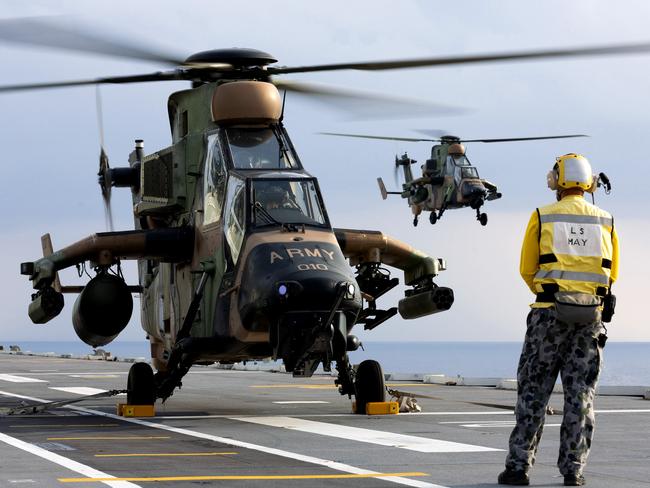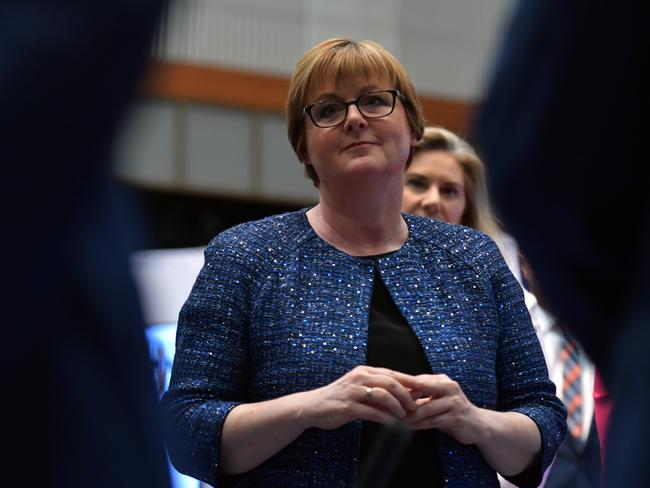Piers Akerman: Defence should dump expensive Barracuda submarine contract
Defence has dumped the useless ARH Tiger helicopters in favour of better ones. Why aren’t they doing the same with their hopeless sinking submarine contract, writes Piers Akerman.
Opinion
Don't miss out on the headlines from Opinion. Followed categories will be added to My News.
A rare glimmer of common sense last week saw Defence move to dump its useless European-designed ARH Tiger armed helicopters and replace them with the all-round better performing American Apache Guardians.
The Morrison government should now demonstrate that this was not a one-off display of intelligence.
It should jettison the disastrously expensive contract signed by the Turnbull government in 2016 with the French company DCNS, now Naval Group, to retrofit their Shortfin Barracuda-class nuclear attack submarines for the Australian navy — a process which is going to cost taxpayers an estimated $80 billion ($30 billion more than initially announced) and won’t see operational vessels in service until at least the mid-to-late 2030s.

In announcing the selection of the Boeing Apache Guardian to replace Army’s Armed Reconnaissance Helicopter (ARH) Tigers from 2025, Defence Minister Linda Reynolds praised the US chopper’s improved sensors, communications suites, attack capabilities and improved survivability.
“This new ARH capability will strengthen Australia’s armed reconnaissance force to better shape our strategic environment and deter actions against our national interest,” she said. “Defence considered a number of helicopters against key criteria of proven ability, maturity and an off-the-shelf operating system.
“The Apache Guardian is the most lethal, most survivable and lowest risk option, meeting all of Defence’s capability, through-life support, security, and certification requirements.
“By pursuing a proven and low-risk system offered by the Apache, Defence will avoid the ongoing cost and schedule risk typically associated with developmental platforms.”
Lessons learnt from issues with the ARH Tiger and other rotary wing projects had informed the strategy to seek a proven, mature ARH replacement capability, her statement continued.
If there have been lessons learnt from the helicopter experience, why aren’t the Defence Minister, her department and the government applying them to the hopeless sinking submarine experiences?

When Labor Defence Minister Kim Beazley signed contracts with the Swedish company Kockums for the Collins class submarines, he said Australia would become a world-class submarine building nation.
It didn’t happen. The six Collins which were built exceeded the budgeted cost and weren’t delivered within the specified time but Labor managed to give expensive work to union members and some said the Swedes were favoured because they had a socialist government.
The Turnbull government also claims that the French contract will make Australia a submarine building nation — but history shows that it is not likely. Former Defence Minister Christopher Pyne has been the biggest beneficiary of the submarine contract with South Australian voters showing their appreciation where it counted most — at the polls.
The French union movement has been the second biggest winner, with its workers being promised the bulk of the work.
The losers are the Australian public who will not only pick up the ever-increasing bill for the redesign and build of the submarines but will also pay for the aged Collins vessels to be maintained until the new boats arrive.

It isn’t as if the nation wasn’t warned either. In 2001, Derek Woolner of the government’s Foreign Affairs, Defence and Trade Group published a paper titled Getting in Early: Lessons of the Collins Submarine Program for Improved Oversight of Defence Procurement.
Discussing the problems he wrote: “However, the clearest warning to the Government is that the new procurement strategy for the combat system parallels that which underlies the difficulties experienced on the Collins submarine program as a whole. This was the decision to shift the procurement strategy from that of acquiring a proven overseas design to one of developing a unique product which more closely matched its ideal specifications.”
Are we purchasing a proven overseas design, as recommended? Definitely not.
The French Barracuda class is nuclear powered and Australia’s insane anti-nuclear policy means our bastardised design will be diesel powered. To re-engineer a nuclear hull carry a diesel engine is just dumb. Not to mention that as the third largest exporter of uranium in the world, we haven’t embraced nuclear energy as a clean power source.
There are a number of submarines with “proven ability, maturity and an off-the-shelf operating system” available.
That said, it is not too late or too expensive, to opt out of the French contract and go with another partner who meet the so-called “key criteria” defined by Defence as we did with the helicopters.


